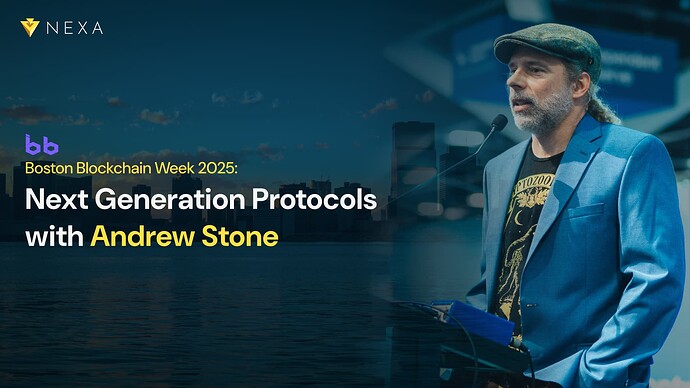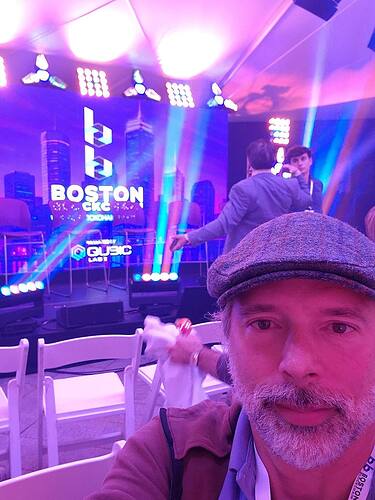Boston Blockchain Week 2025 brought together innovators, researchers, and builders from across the blockchain and AI ecosystems to explore the technologies shaping decentralized infrastructure. Among the event’s more technical discussions was the panel “Next-Generation Protocols: Balancing Privacy, Performance, and Interoperability”, featuring Andrew Stone, Founder and Lead Developer of Nexa, alongside other known names from across the blockchain landscape.
Next Generation Protocols at Boston Blockchain Week 2025
The panel, moderated by Sergey Kusnetdinov (Gain Ventures), convened on 11 September 2025 at the Main Auditorium & Expo Hall in Quincy, Massachusetts. Joining Andrew Stone were Robert Hirsch (Zkalyx), Helen Sharron (Selfient), and Will Waltrip (AvaCloud). Together, they examined how emerging blockchain protocols are addressing the technical and governance trade-offs inherent in achieving scalability, interoperability, and user privacy at a global scale.
Andrew Stone reflected on the early days of Bitcoin and the early concepts of a programmable UTXO blockchain. He noted that in its formative stage, the protocol faced numerous security flaws, which later influenced the development of the source code. As a result, other cryptocurrencies emerged with alternative solutions such as smart contracts.
Discussion centered on the interoperability challenge of interconnecting blockchains while preserving decentralization. Andrew Stone, Lead Developer of Nexa, provided technical insights into the core of the problem, offering an analogy that compared different systems managing the same object but with fundamentally different security assumptions. Because each blockchain is designed with its own feature set and trust model, creating a truly decentralized and interoperable blockchain bridge remains an extremely difficult problem.
Andrew Stone also explained partial transactions and their operation, which effectively enable decentralized trading and bidding across any communication channel. This mechanism allows transactions to be finalized instantly, functioning as a form of atomic exchange in which native assets can be swapped without relying on smart contracts or centralized infrastructure.
Concluding the panel, Sergey Kusnetdinov asked what the most important protocol innovation of the coming years might be. Andrew provided valuable insights into quantum-resistant protocols, noting that as quantum technologies advance, ensuring cryptographic resilience against potential threats will be essential to maintaining confidence in future blockchain systems.
Academic and Industry Collaboration
Boston Blockchain Week once again served as a bridge between academia and industry, hosting over one hundred sessions spanning decentralized AI, governance frameworks, and secure protocol engineering. Nexa’s participation in the program reflected its ongoing commitment to advancing open, scalable systems through rigorous research and applied innovation.
By engaging in technical panels such as this, Nexa developers contribute to the broader technical discourse and deepen the understanding of how blockchain infrastructure is evolving. They also examine the complexity of emerging technologies while balancing these advancements with real-world demands and practical deployment.
In Conclusion
The Next-Generation Protocols panel offered valuable insights into how blockchain protocols are evolving to meet the demands of an increasingly interconnected world. Andrew Stone’s contributions highlighted a forward-looking approach to the industry’s emerging topics, such as atomic exchanges and the importance of quantum resistance. Thank you for joining us on another journey.


